‘I’m Afraid The Bird Will Die’: Watch the Captivating Short Film Set to J. R. August Song
February 10th, 2022 - The atmospheric short film shows members of an isolated women’s commune getting a little girl ready for a coming-of-age ceremony
Croatian singer and songwriter J. R. August released a video for the song ‘I’m Afraid the Bird Will Die’, a track from his album Murky Waters (The EP Collection).
More precisely, it’s a captivating short film, written and directed by Stefan Đorđević. Đorđević is a talented young filmmaker whose earlier work won awards at film festivals in Sarajevo, Zagreb, Locarno and Belgrade.
Set to the haunting melancholic song, the film shows members of an isolated women’s commune getting a little girl ready for a coming-of-age ceremony. She is promised to marry a boy from a male commune after the ritual. Confused by expectations set for her, the girl runs away with another boy she likes.
Watch the film here:
‘I imagined this film as a visual experience, so I wanted to play up the atmosphere typically associated with communes. There is mud, and darkness, and poetry borne of colours of a childhood ended abruptly. But childhood doesn’t end when someone says it’s over. It only ends once imagination is gone’, said the filmmaker.
J. R. August (real name Nikola Vranic) is a Croatian singer, songwriter and producer known for sold-out concert halls, raving reviews and international praise he's been receiving in recent years. He was quite pleased that the cinematic project was brought to life after a long wait.
‘I’m extremely pleased that fate brought me to Stefan, as I believe he’s one of the most talented filmmakers in our region. From the very beginning, the project has been framed as something that isn’t ‘cheap’ and mustn’t appear as such, and seeing that fortune favours the bold, we finally made it in the end’, said the musician.
J. R. August and Đorđević first made plans to shoot the short film in 2016, but it was only last year that the filmmaker and his outstanding crew finished the project. The film was produced by the French company Eddy Production and co-produced by Servia Films from Serbia.
The National Center for Film and Moving Images (CNC) in France saw the potential of the artistic project and granted funds to both production companies to help bring the film to life.
The film was shot in Serbia over the course of three days, in a karst area between the Lazarus canyon and Dubašnica river. It stars young actors Jana Nikčević and Đorđe Davidović.
The video premiered on Vimeo last week and had its YouTube premiere on February 7th, 2022.
Aki Rahimovski, Lead Singer of Croatian Rock Band 'Parni Valjak', Dies Aged 66
The band announced the tragic news with a touching message on their socials, dedicated to their frontman and friend of over 30 years
Aki Rahimovski, lead singer of the iconic Croatian rock band ‘Parni Valjak’, died earlier today, January 22nd 2022. He was 66 years old.
His manager Damir Osredečki confirmed that Rahimovski had suddenly fallen ill this morning and was hospitalised in Novo Mesto. He passed away shortly thereafter, reports Novi list.
The band announced the news with a touching message on their socials, dedicated to their frontman and friend of over 30 years.
'Dear friends, with an unspeakable sadness in our hearts we inform you that today, January 22nd 2022, Aki Rahimovski passed away', says the announcement.
Rahimovski was born in Niš, Serbia in 1955 and soon moved to Skopje, Macedonia with his family. His father was a music teacher; Aki followed in his footsteps and enrolled in music school where he studied singing and piano from the age of seven.
He formed his first two bands as a teenager, named Grupa Vakuum and Krvna braća. As stated in his biography on the official website of the band Parni Valjak, Rahimovski had always been fascinated by rock music and never missed an opportunity to get new albums on vinyl from abroad. At the age of 15, he was already an editor at Radio Skopje; a year later, he was playing with the Macedonian band Torr.
One of the most popular rock acts in ex-Yugoslavia that retained its cult status to this day, Parni Valjak was founded in 1975 when composer and guitarist Husein Hasanefendić Hus saw Aki perform at the Boom festival. Hus was captivated by Rahimovski’s stage presence and approached him with the idea to form a new band. It didn’t take long for Rahimovski to accept the offer and move to Zagreb, and so began one of the most wonderful stories of music in these parts.
In their career of 30 years, Parni valjak came out with 16 studio albums, 14 singles, five live albums, four best-of compilations and two concert DVD-s. Among them is one of the best-selling Croatian albums of all time and the best-selling live album, ‘Unplugged: Live from ZeKaEm’ (Bez struje: Uživo iz ZeKaEm-a).
BBC Symphony Orchestra Plays Dora Pejačević, Croatia’s First Female Composer
Listen to the most famous works of Croatia's first female composer Dora Pejačević, performed by the BBC Symphony Orchestra and pianist Nataša Veljković
BBC Radio 3 recently featured three works of Croatian composer Dora Pejačević in their Radio 3 in Concert musical programme.
Named ‘Masterpiece Rediscovered’, this episode centers around Symphony in F sharp minor written by Dora Pejačević. It was broadcast live from the Barbican Hall and performed by the BBC Symphony Orchestra with conductor Sakari Oramo at the helm.
Symphony in F sharp minor op.41 is considered to be the first modern Croatian symphony and one of the most distinguished works of Croatia’s first female composer.
The programme also features another famous work of Dora Pejačević, the piano cycle Blumenleben op.19 (The Life of Flowers). Performed by pianist Nataša Veljković, the opus consists of eight individual pieces inspired by different flowers associated with certain stages of life.
Countess Dora was a member of the House Pejačević, an influential noble family who were based in Slavonia and counted high state officials, military officers and politicians among their ranks.
Born in 1885, Dora Pejačević first received piano lessons from her mother at their family residence in Našice. She went on to study music privately in Zagreb, Dresden and Munich, but considering that she never studied continuously for a longer period of time, she’s considered to have been largely self-taught.
She had written her first composition at the age of 12 and went on to compose 58 opuses with 106 compositions in total between 1897 and 1922.
Her piano concerto (1913) is the first concerto ever written by a Croatian composer.
Even though she’s known as one of the most notable Croatian composers of classical music and was a highly prolific creator, most of her work still hasn’t been published and given the recognition it deserves.
Tune in to listen to the Symphony in F sharp minor on BBC. The recording will be available until December 26th, 2021 and also features Ludwig van Beethoven’s Violin Concerto in D major and two works of British composer Edward Elgar.
Learn more about the family Pejačević and their two castles in Našice in this feature.
Croatia Records Jugoton Funk Reveals Hrvatska's Heaviest Grooves
ZAGREB October 23, 2020 - Preserved by Zagreb's Croatia Records, the vast archive of giant Yugoslavian music label Jugoton throws up some incredible surprises on the newly released Croatia Records Jugoton Funk Vol. 1
James Brown, Funkadelic, Sly & The Family Stone, Fela Kuti - when you think of funk music, it's black artists that usually come to mind. Although, not if you're Croatian. One of the country's best-loved (and most missed) musicians, Dino Dvornik, was often referred to as the King Of Croatian Funk - his electro explorations in the genre during the early 90s were so innovative they don't sound out of place on dancefloors today. But, though he here might be known as the king of this style, Dino Dvornik was far from the first to record funk music in Croatia.
Marijan Kašaj - Ideja
One of the highlights of Croatia Records Jugoton Funk Vol. 1. Although a classically trained opera singer, Zagreb's Marijan Kašaj expressed a much more rough vocal style when singing rock music, notably as the frontman of the band Grešnici (The Sinners). This song comes only from a rare 45 single and was composed and arranged by Vladimir Delač
The recently released Croatia Records Jugoton Funk Vol. 1 compilation finally lifts the lid on the largely untold history of homegrown Croatian funk music. Culled from the darkest depths of the gargantuan Croatia Records Jugoton archive in Dubrava, this collection tells a story of ambitious musicians joyfully creating some of the wildest sounds to have ever come from these lands. Effortlessly cool and in many cases very surprising, it is a soundtrack that is perhaps even more relevant on today's world stage than when it was made.
Dalibor Brun - Davni život
Rijeka musician Dalibor Brun explored soul and funk music across three solo albums. This track, from his third, features a wild Hammond solo performed by extremely famous Croatian singer and songwriter Oliver Dragojević. “You can hear some funky tracks in Oliver's own back catalogue, but to find him playing such a wild style as a session musician on Dalibor Brun's track is a very unexpected,” says Dr. Smeđi Šećer. “At the time of these recordings, some of these artists were already well established, so they could afford to collaborate and experiment as they wished.”
“Most of Jugoton's output was pop and folk music,” Croatia Records Jugoton Funk Vol. 1's Dr. Smeđi Šećer tells TCN. Alongside co-compiler, Zagreb's Višeslav Laboš, this Rijeka DJ is part of a small scene of enthusiasts who have been reviving the ex-Yu funk sound over recent years - online, on mixtapes and at niche club nights. “These are mostly very obscure releases. You would have to go looking around secondhand record shops for maybe 10 years to find all of these.”
Igor Savin - Alfa
Son of prominent Croatian conductor, composer and opera director Dragutin Savin (longtime director of the Osijek Opera), Igor Savin is a pianist, vibraphonist, composer, arranger and producer who studied at the Theoretical Department of the Academy of Music in Zagreb. He continued his studies by one of the first Croatian students at the prestigious American College of Contemporary Music Industry Berklee College of Music in Boston where he studied harmony, improvisation and composition. As an eighteen-year-old, he founded his first jazz band. He played piano and vibraphone in symphony, studio and festival orchestras, and in the Big Band of HRT. He is the author of music for numerous films, cartoons, television shows, theatre plays and often used melodies from Balkan folk music to inspire his jazz and contemporary classical pieces. In 1984, he founded the electronic studio of the Vatroslav Lisinski Concert Hall.
Time spent rifling through secondhand shops for old, forgotten and obscure music is a pastime known as digging. A phenomenon popularised since the birth of American hip hop in the 1980s, it has been responsible for turning the music of the past into some of the most-contemporary sounds we hear on today's radio or dancefloors. Over the last four decades, countless soul, R&B and hip hop stars have sampled older music to create chart-topping hits. Digging for vintage sounds has subsequently become a global trade. Obsessives Dr. Smeđi Šećer and Višeslav Laboš are two of the best-informed that search for contemporary-relevant sounds in the back catalogues of Balkan music.
Josipa Lisac - Ležaj od suza
'Ležaj od suza' (A bed of tears) is taken from Croatian megastar Josipa Lisac's classic debut LP 'Dnevnik jedne ljubavi'. It is not the only track on the album which you can hear international funk DJs play in some of the coolest clubs in London, Berlin, Manchester and New York. She is backed here by Jugoton's first prog-rock band, Time, plus the strings and horns section of the HRT Orchestra. The iconic cover art of Lisac's debut album was a photograph taken by Croatian photographer Jozo Ćetković, who also took the photograph of Croatian model Branka Habek which is used to form the cover art of Croatia Records Jugoton Funk Vol. 1
For Croatia Records Jugoton Funk Vol. 1, they've been greatly assisted in their endeavors by Zagreb's Croatia Records. Not always regarded as the hippest supplier of niche sounds like forgotten funk, Croatia Records's careful preservation of the Jugoton back catalogue (which they inherited after the break-up of Yugoslavia), has meant that the entire recorded history of the giant Yugoslav label has been made available not only to album compilers like Smeđi Šećer and Višeslav Laboš, but to all. Over recent years, Croatia Records has embarked on an ambitious project to digitalise the entire Jugoton archive. Containing some 70, 000 music recordings and 14, 000 artifacts, this is no small undertaking.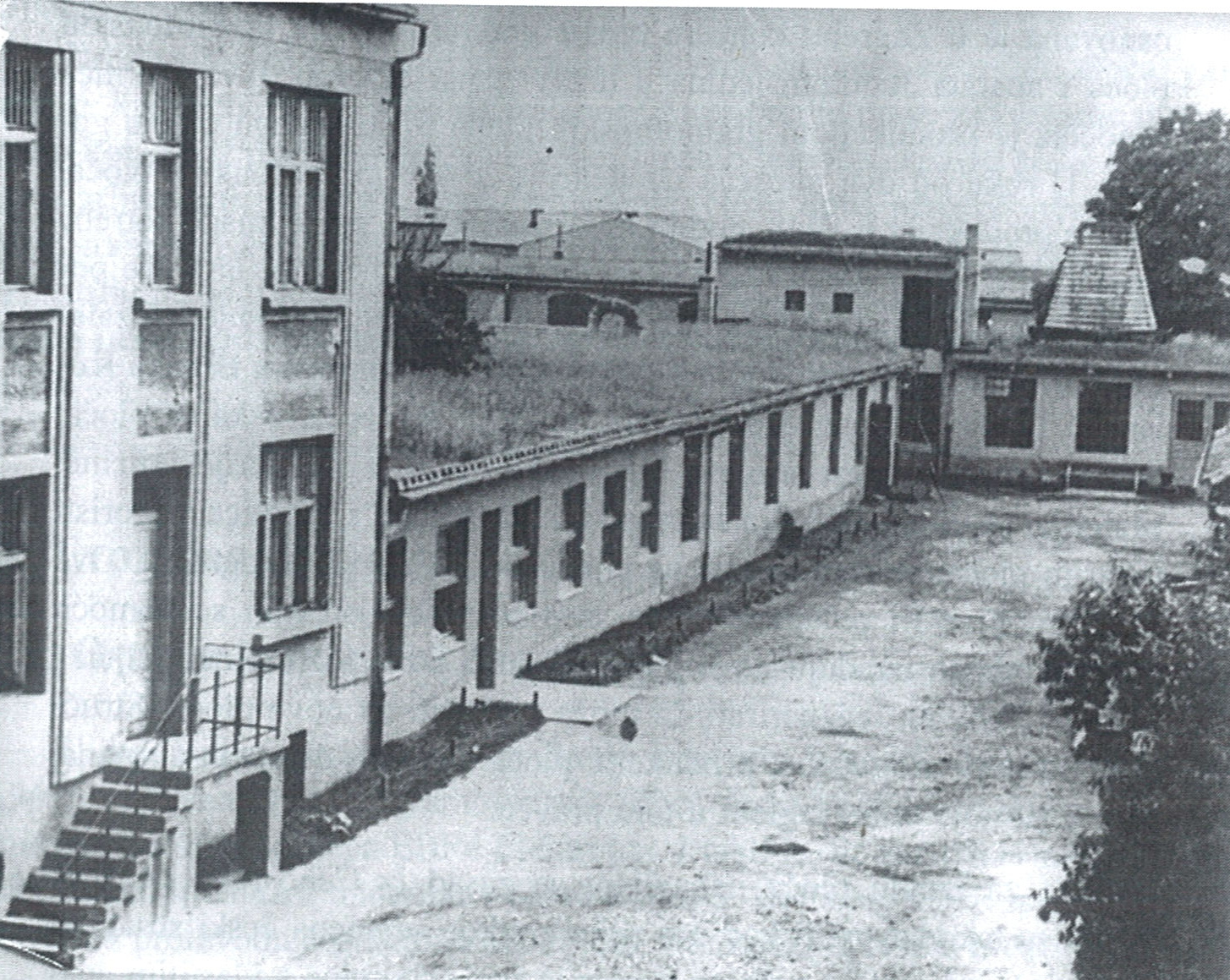 The first Jugoton Records HQ, located at Ilica 213, Zagreb. It subsequently moved to Dubrava, on the site where Croatia Records remains today © Photos from the book History of Vinyl Production in Croatia by Veljko Lipovšćak - provided by Croatia Records
The first Jugoton Records HQ, located at Ilica 213, Zagreb. It subsequently moved to Dubrava, on the site where Croatia Records remains today © Photos from the book History of Vinyl Production in Croatia by Veljko Lipovšćak - provided by Croatia Records
Of all the companies that issued music in the former Yugoslavia, Jugoton was the largest. Based in Dubrava, Zagreb, Jugoton was much more than the type of record label we know today - theirs was an entire industry of culture. Jugoton traces its roots all the way back to the 1930s when it began life as the Elektroton label. After the Second World War, the label was nationalized and renamed Jugoton.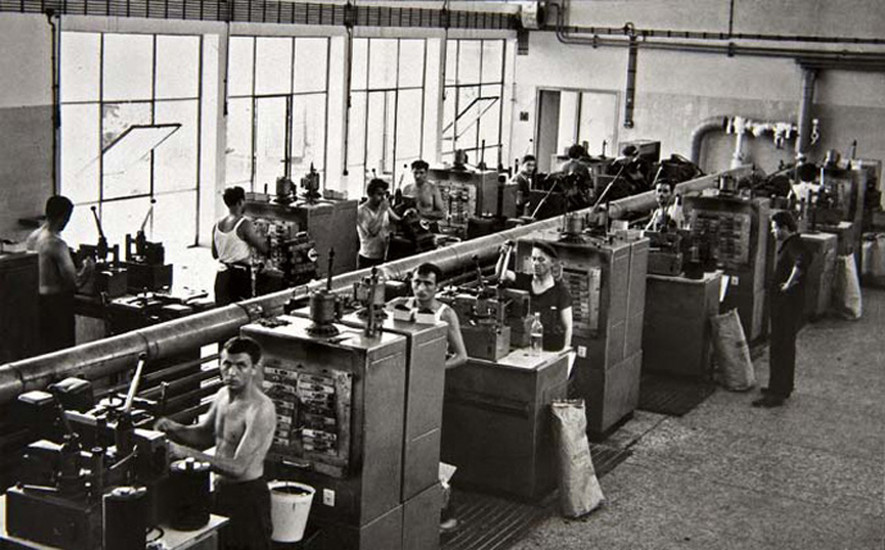
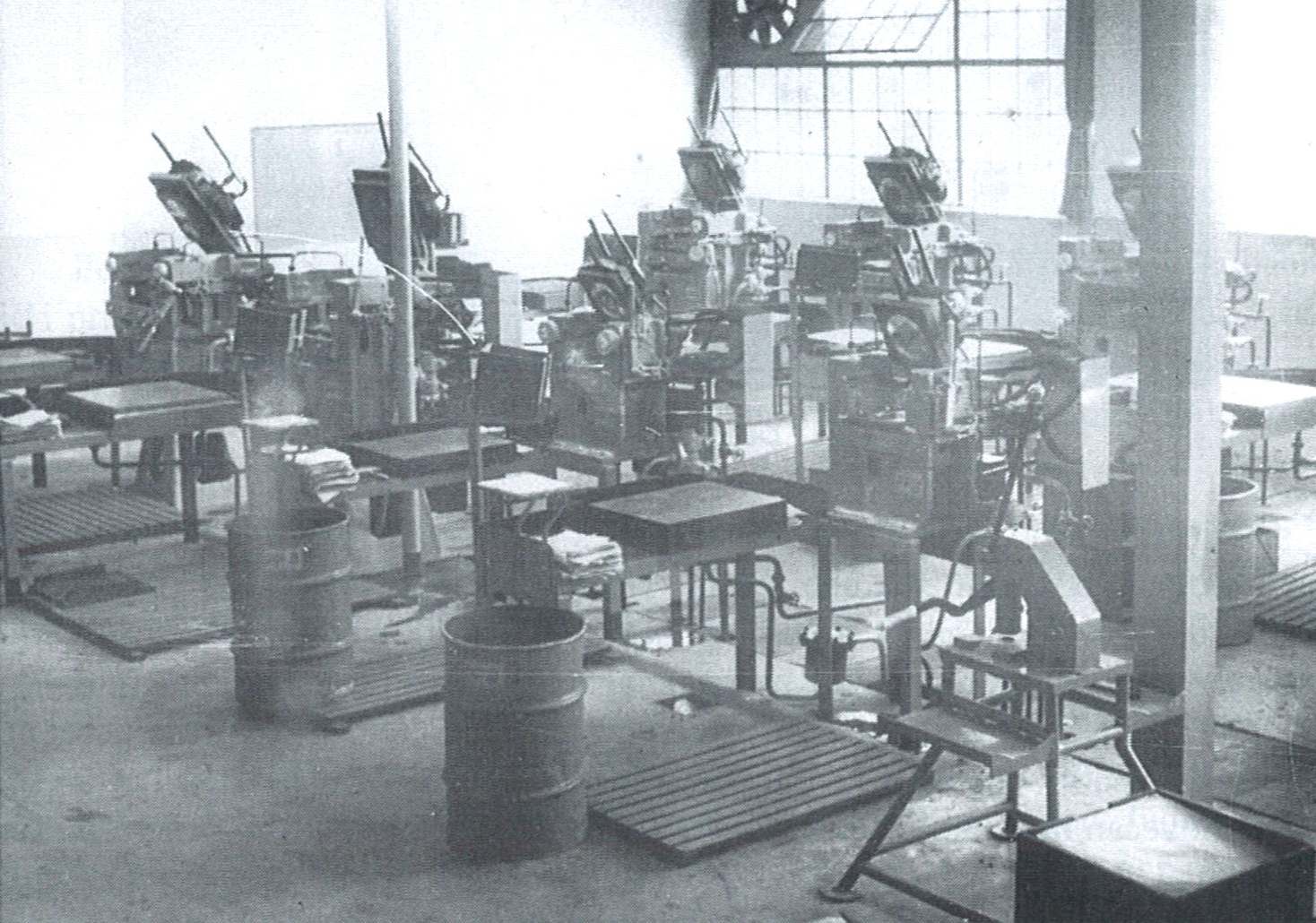 In the two photos above, we can see the Jugoton vinyl pressing factory at two different stages of its evolution © Photos from the book History of Vinyl Production in Croatia by Veljko Lipovšćak - provided by Croatia Records
In the two photos above, we can see the Jugoton vinyl pressing factory at two different stages of its evolution © Photos from the book History of Vinyl Production in Croatia by Veljko Lipovšćak - provided by Croatia Records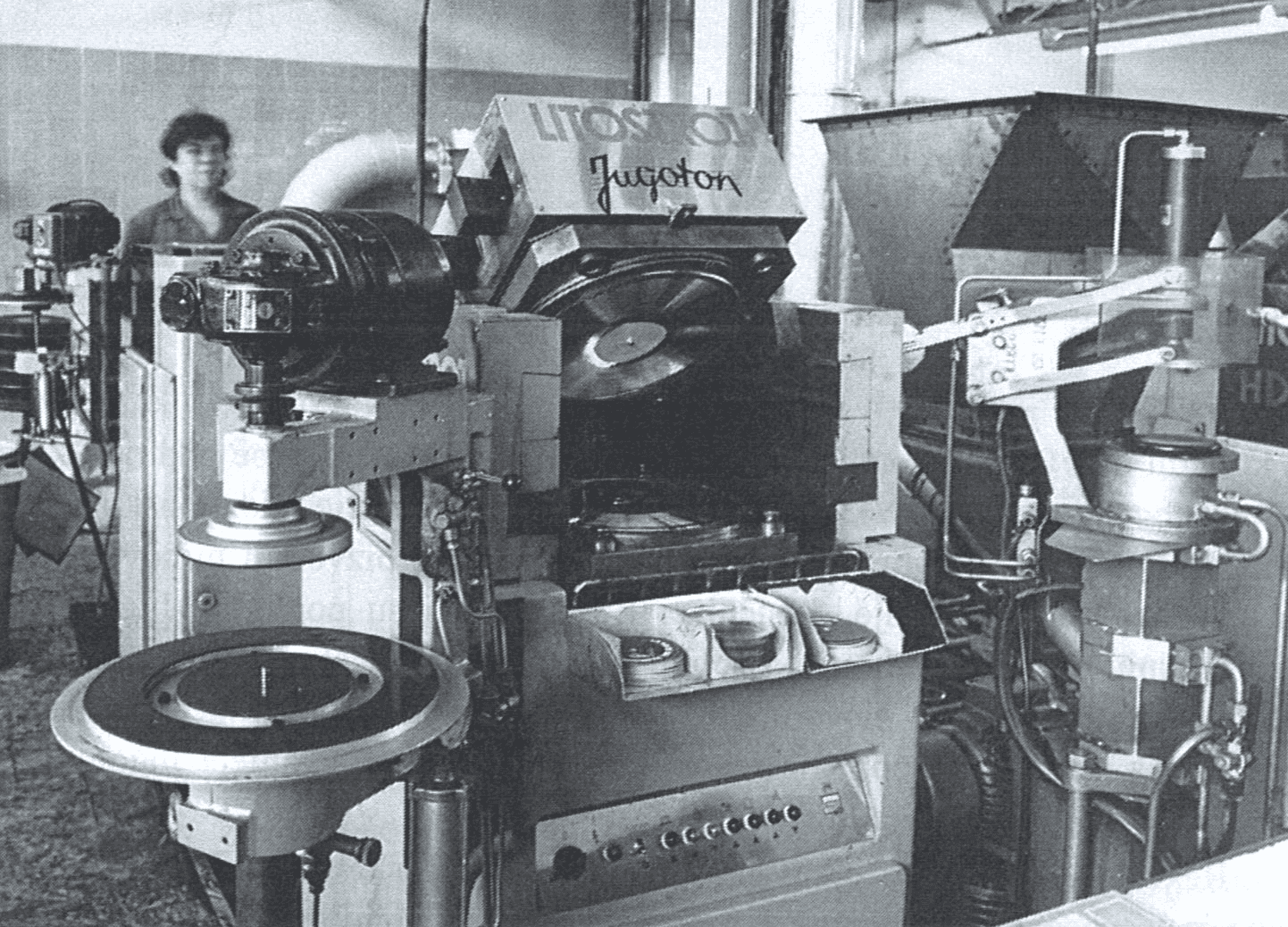 The hydraulic semi-automatic vinyl pressing machine 'Litostroj' at the Jugoton pressing plant 1967 - 1979 © From the book History of Vinyl Production in Croatia by Veljko Lipovšćak - provided by Croatia Records
The hydraulic semi-automatic vinyl pressing machine 'Litostroj' at the Jugoton pressing plant 1967 - 1979 © From the book History of Vinyl Production in Croatia by Veljko Lipovšćak - provided by Croatia Records
At the peak of its influence, Zagreb's Jugoton did more than just sign artists and release music. On the Dubrava site where Croatia Records now stands was a then ultra-modern production studio where famous artists from all over Yugoslavia would come and record. Jugoton made its own discs – at its peak, Jugoton's pressing plant churned out 30, 000 vinyl records every day. By 1982, its decade-old cassette production line made 20,000 units per day. They also owned the largest chain of music stores within the country. As well as the domestic artists signed to Jugoton, the label licensed and released music by some of the biggest artists of the day, including Elvis Presley, The Beatles, The Rolling Stones, Deep Purple and Pink Floyd. Its audience was the 20 million+ inhabitants of Yugoslavia.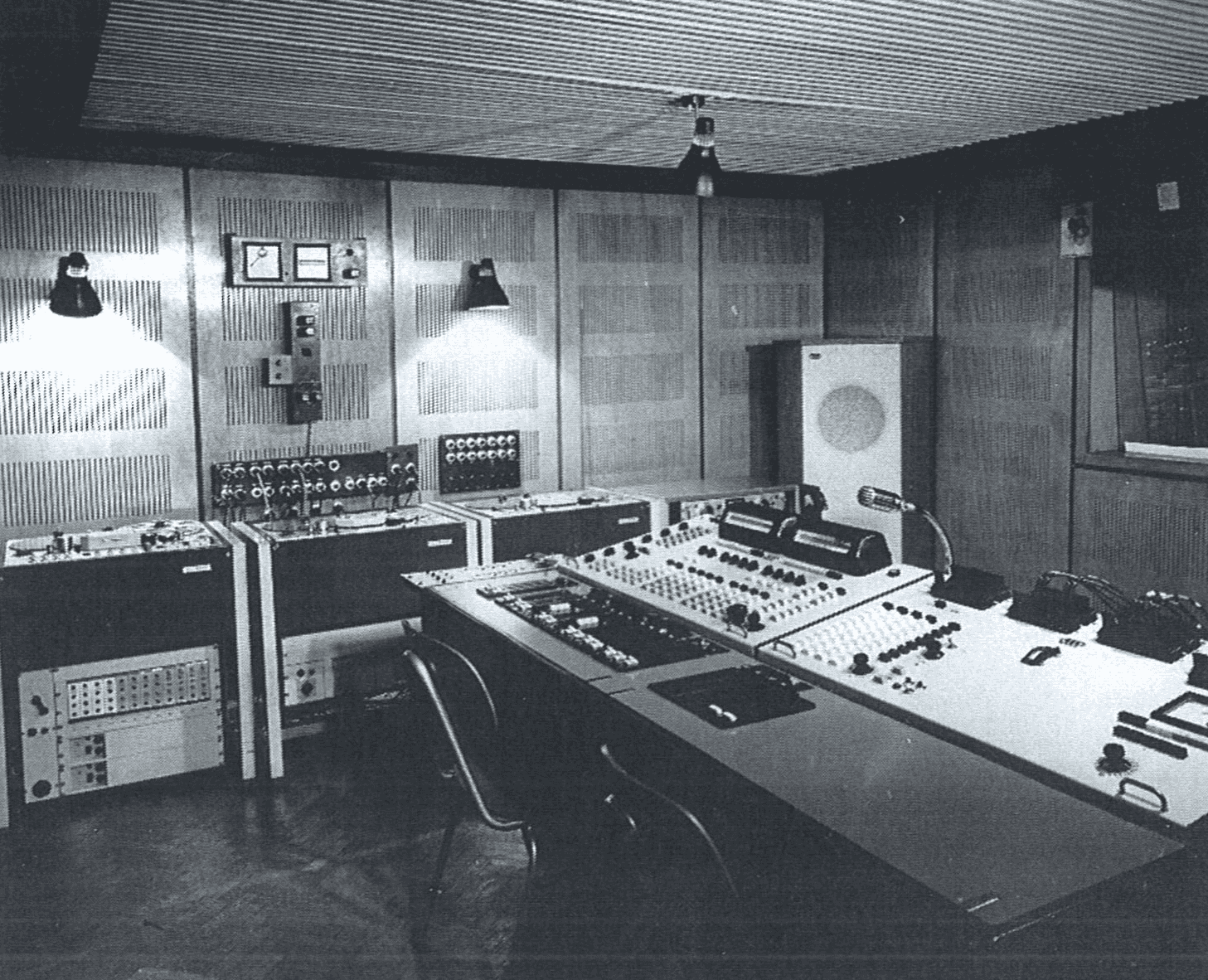 Part of the Jugoton studio set up on the Dubrava site. This specific equipment was in use between 1964 and 1975 © From the book History of Vinyl Production in Croatia by Veljko Lipovšćak - provided by Croatia Records
Part of the Jugoton studio set up on the Dubrava site. This specific equipment was in use between 1964 and 1975 © From the book History of Vinyl Production in Croatia by Veljko Lipovšćak - provided by Croatia Records
Though the music contained in Croatia Records Jugoton Funk Vol. 1 does not sound immediately like the folk and pop music we associate with the label, considering the size of the Croatia Records Jugoton archive it is perhaps less surprising that such anomalies can be found.
“Western music always had a strong appeal in Yugoslavia,” says Dr. Smeđi Šećer. “At the beginning of the communist regime, there was a strong implementation of censorship. But, in the 1960s the (communist) party seemed to relax and allow some western influences through. From this decade, a lot of cover versions of western artists started to be recorded by Yugoslavian singers. Yugoslavian labels would officially license western music and release it here. For instance, you can find releases by Ray Charles on the PGP-RTB label out of Belgrade from the early 1960s. All of this started to influence the music made here. Arsen Dedić, for example, recorded the first Yugoslavian bossa nova record in 1963.”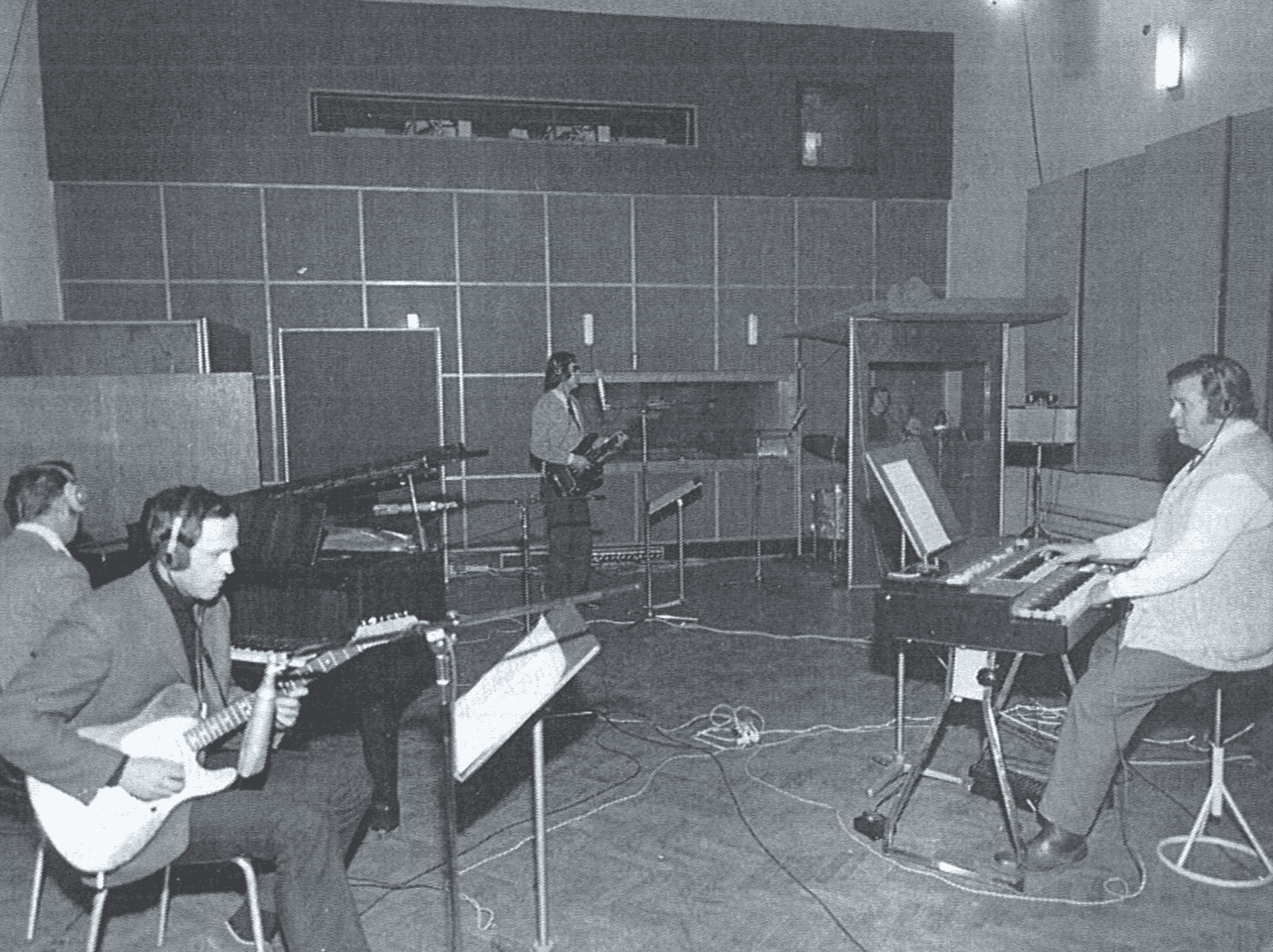 Zagreb musicians pictured at the small sound hall at Jadran film © From the book History of Vinyl Production in Croatia by Veljko Lipovšćak - provided by Croatia Records
Zagreb musicians pictured at the small sound hall at Jadran film © From the book History of Vinyl Production in Croatia by Veljko Lipovšćak - provided by Croatia Records
“The funk sound from here can be really interesting - quite unique. While some bands did try to record this black American music in exactly the style as the Americans did it, many artists from here enjoyed experimenting with the style - in particular some pop artists and progressive rock bands. They took the rhythm and the funk from the American music, but added their own styles – sometimes distinctly Balkan styles – over the top. Boki Milošević and the Belgrade Jazz Orchestra spring to mind immediately.”
Zdravko Čolić - Mujo kuje konja po mjesecu
A giant of Yugoslavian music, Zdravko Čolić's inclusion on Croatia Records Jugoton Funk Vol. 1 is one of the most unusual (and rarest) pieces of music in his back catalogue. It is a funk version of the Bosnian sevdah classic 'Mujo kuje konja po mjesecu (Mujo changes the horseshoe by the moonlight)'. “This is from an extremely rare compilation of pop festival music,” says Dr. Smeđi Šećer. “It's not something you'd come across every day. It was shown to me by a Slovenian DJ colleague. I only ever saw a physical copy of this release maybe two or three times in all my years spent digging.”
The world's largest exporter of music is the United States. The second-largest is the United Kingdom. That these two largest exporters share a common language – and it being one of the world's most widely spoken – is no coincidence. It can be difficult to export music from Croatia and other Balkan nations purely because of the language barrier. People like to understand the text of what they are listening to. Such barriers can be overcome with overtly emotional delivery, such as in the case of folk music like sevdah, but also when the musical style is something relevant to the dancefloor. Especially within a niche international scene like rare funk.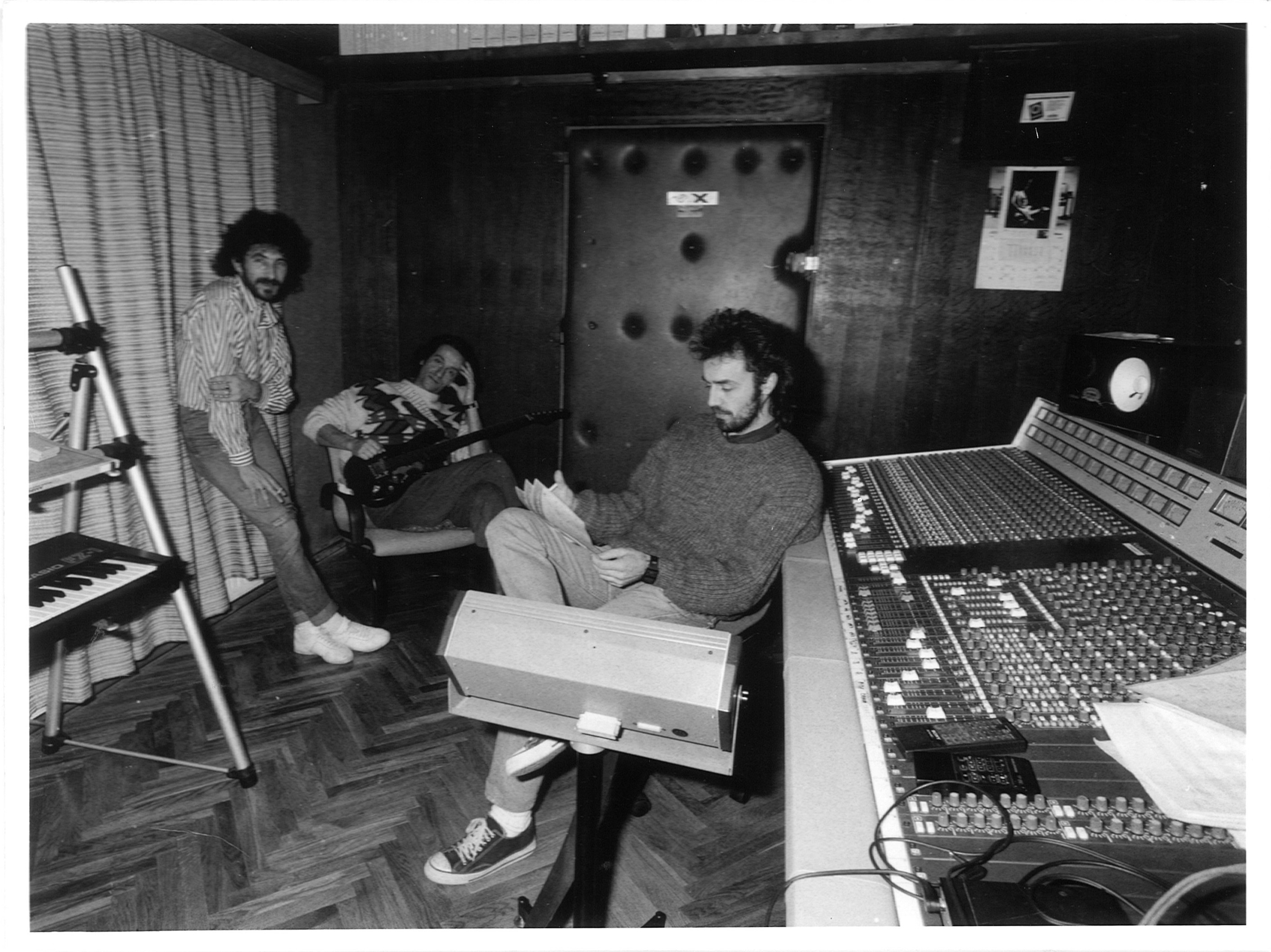 Even after the label stopped being Jugoton and became Croatia Records, famous artists from all the former countries of Yugoslavia would still come to work at the recording studios in Dubrava. In this photo from the early 1990s we see (left to right) Croatian singer Željko Bebek from the Sarajevo-formed Yugoslavian rock giants Bijelo Dugme, Macedonian guitar virtuoso Vlatko Stefanovski from the band Leb i sol and Bosnian singer, guitarist, arranger and producer Nikša Bratoš from the band Crvena Jabuka. Bijelo Dugme was the most popular and best-selling rock band from Yugoslavia. Their first recordings were offered to record label Diskoton in their native Sarajevo. They were turned down, allegedly as the label's release schedule was already full for the following six months. This is widely considered the greatest business mistake in the history of Yugoslav record publishing. On the same day as this refusal, Zagreb's Jugoton snapped the band up for an initial five-year contract © Photo from the Croatia Records archive and licensed for exclusive use within this article by Croatia Records
Even after the label stopped being Jugoton and became Croatia Records, famous artists from all the former countries of Yugoslavia would still come to work at the recording studios in Dubrava. In this photo from the early 1990s we see (left to right) Croatian singer Željko Bebek from the Sarajevo-formed Yugoslavian rock giants Bijelo Dugme, Macedonian guitar virtuoso Vlatko Stefanovski from the band Leb i sol and Bosnian singer, guitarist, arranger and producer Nikša Bratoš from the band Crvena Jabuka. Bijelo Dugme was the most popular and best-selling rock band from Yugoslavia. Their first recordings were offered to record label Diskoton in their native Sarajevo. They were turned down, allegedly as the label's release schedule was already full for the following six months. This is widely considered the greatest business mistake in the history of Yugoslav record publishing. On the same day as this refusal, Zagreb's Jugoton snapped the band up for an initial five-year contract © Photo from the Croatia Records archive and licensed for exclusive use within this article by Croatia Records
“Quite a few of these records are well known among connoisseur collectors outside of ex-Yu countries and they have a high price,” says Dr. Smeđi Šećer. “You can find Yugoslavian funk included on mixtapes by rare funk and hip hop collector DJs from all over the world. I know of one mixtape made by a well-known DJ from New York which uses only music released in the former Yugoslavia. And why shouldn't that be the case? This is the era we live in. You can go out in Zagreb and hear a Croatian DJ play Peruvian psychedelic cumbia music or afrofunk, so there are definitely DJs in the UK, the USA - maybe even Peru - who will play Yugoslavian funk. It's just feel-good dancefloor music that transcends all boundaries.”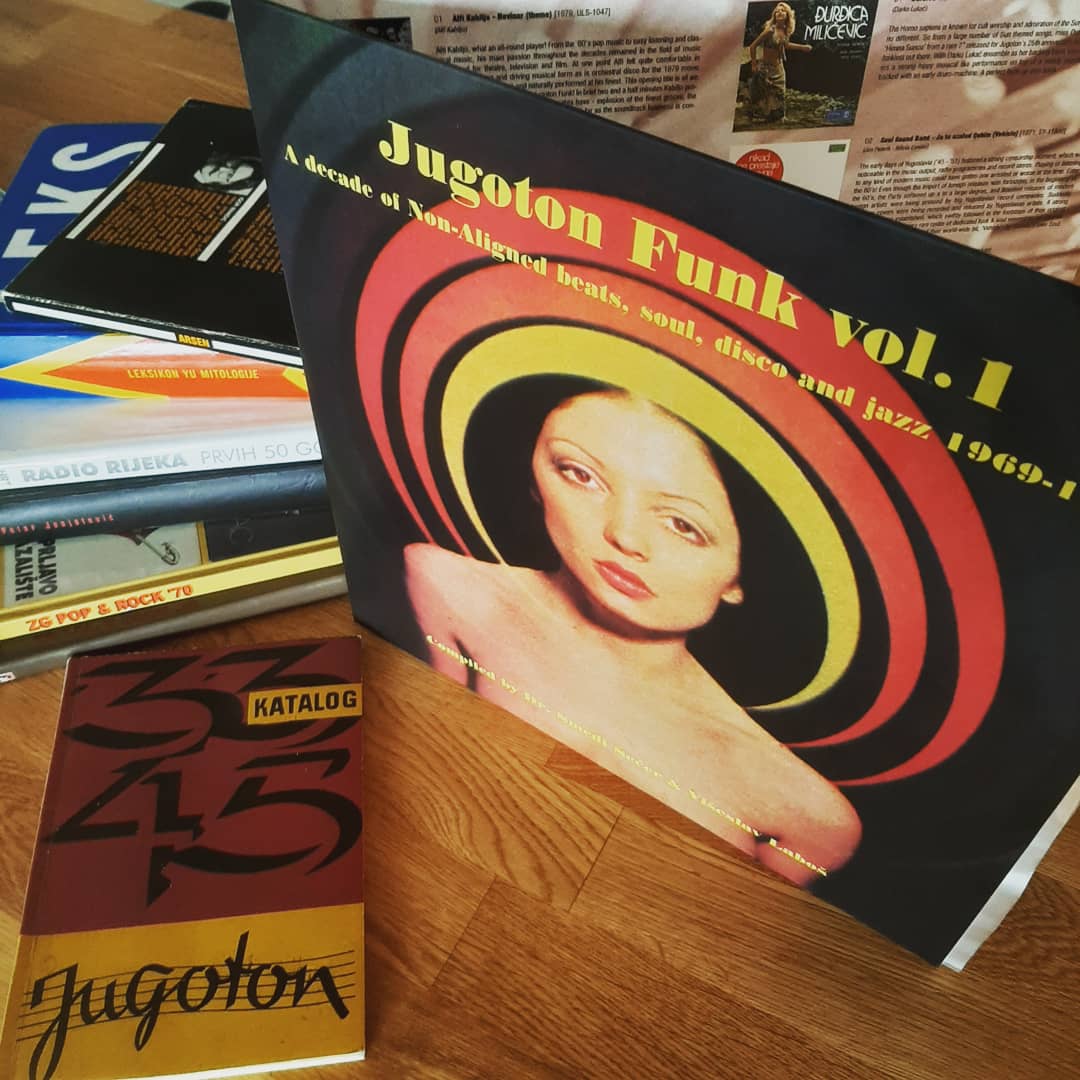
The digital and CD version of Croatia Records Jugoton Funk Vol. will be released shortly by Croatia Records. The extravagantly designed double vinyl album version is out now and was released under license by specialist Dutch vinyl company Everland Music. The last vinyl album produced by Jugoton’s vinyl pressing plant in Croatia was a disc containing the sermons of Pope John Paul II
For the latest travel info, bookmark our main travel info article, which is updated daily.
Read the Croatian Travel Update in your language - now available in 24 languages.
PHOTOS: Pula Amphitheatre and Zagreb Arena Lit Red for Events Industry
September 3, 2020 - Three of Croatia's most internationally famous venues in the events industry were lit in spectacular red on Monday. Pula amphitheatre, Zagreb Arena and Fort Punta Christo were bathed in light from sunset until after dark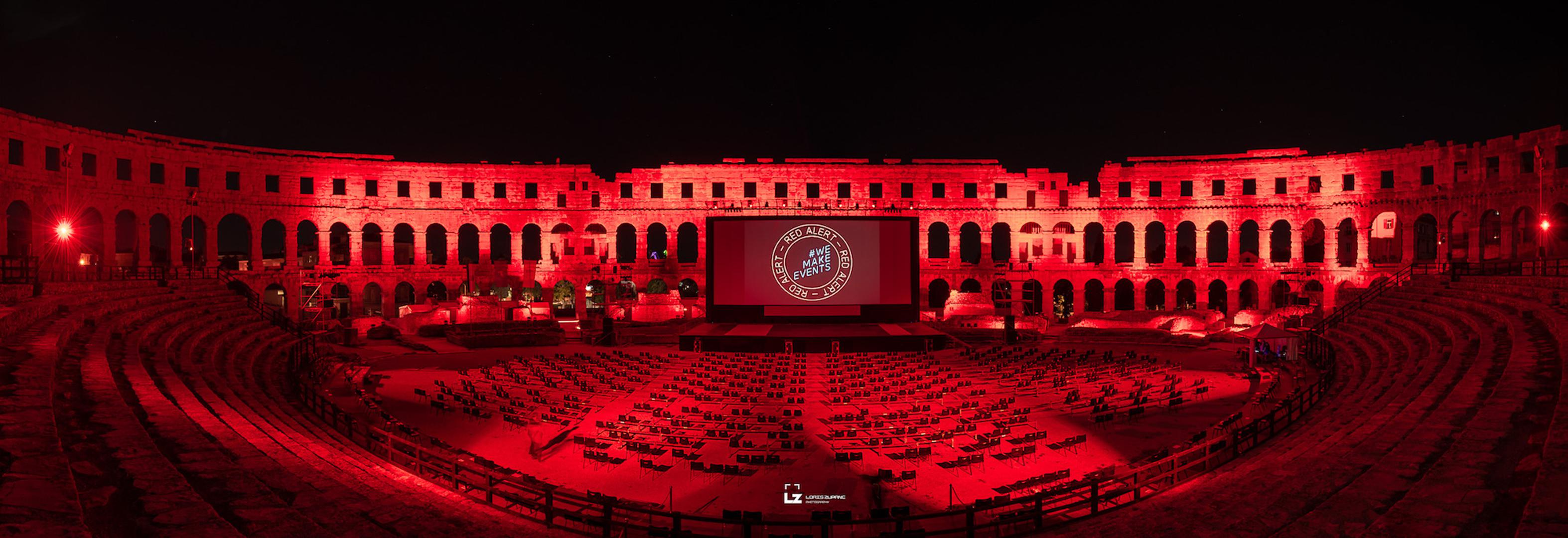
Three of Croatia's most internationally famous venues used by the events industry were lit in spectacular red on Monday. Pula amphitheatre, Zagreb Arena and Fort Punta Christo, also in Pula were bathed in light from sunset until after dark.
Though the change in appearance was enjoyable and visually impressive, the action was undertaken to send a strong message. It was part of a worldwide campaign to highlight the effects of Coronavirus on the events industry and those who work within it.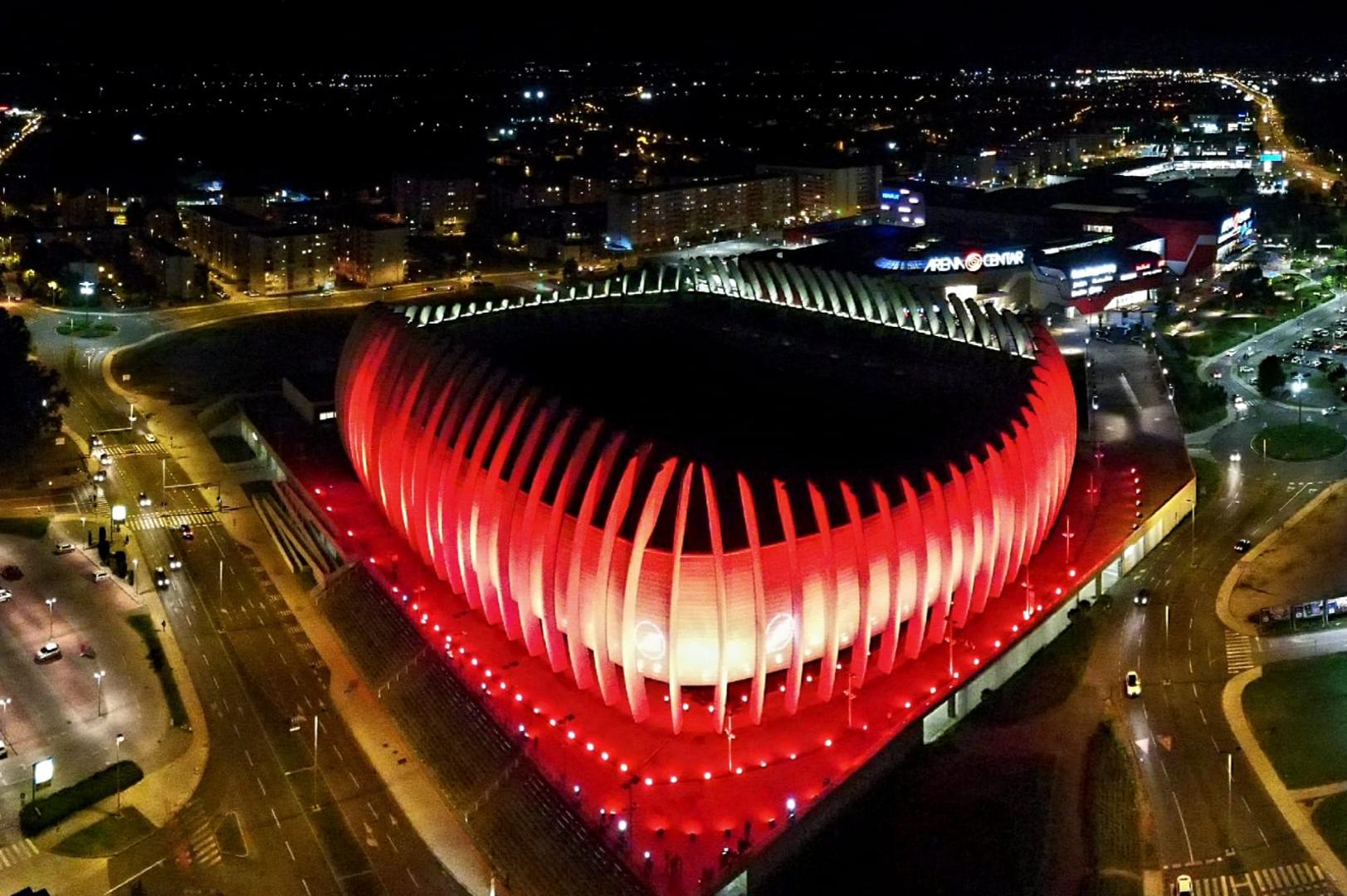
Some of the most famous historical buildings, concert venues and event halls in the world joined the Red Alert campaign and were similarly lit on the same night.
Large public events have been put on hold over most of the world under epidemiological guidelines. Seating arrangements in theatres, conference halls, sports and music halls are simply not compatible with social distancing regulations – many such venues could not make a profit by holding events at 50% capacity.
This has affected millions around the world who work in the events industry, from musicians and performers to technicians, bookers, agents, the media, PR representatives, venue management and general staff. Freelancers operating within the events industry are some of the hardest hit and have had all of their income sources removed completely. Many who operate in the events industry are highly trained and skilled, so diversifying into other industries can be problematic.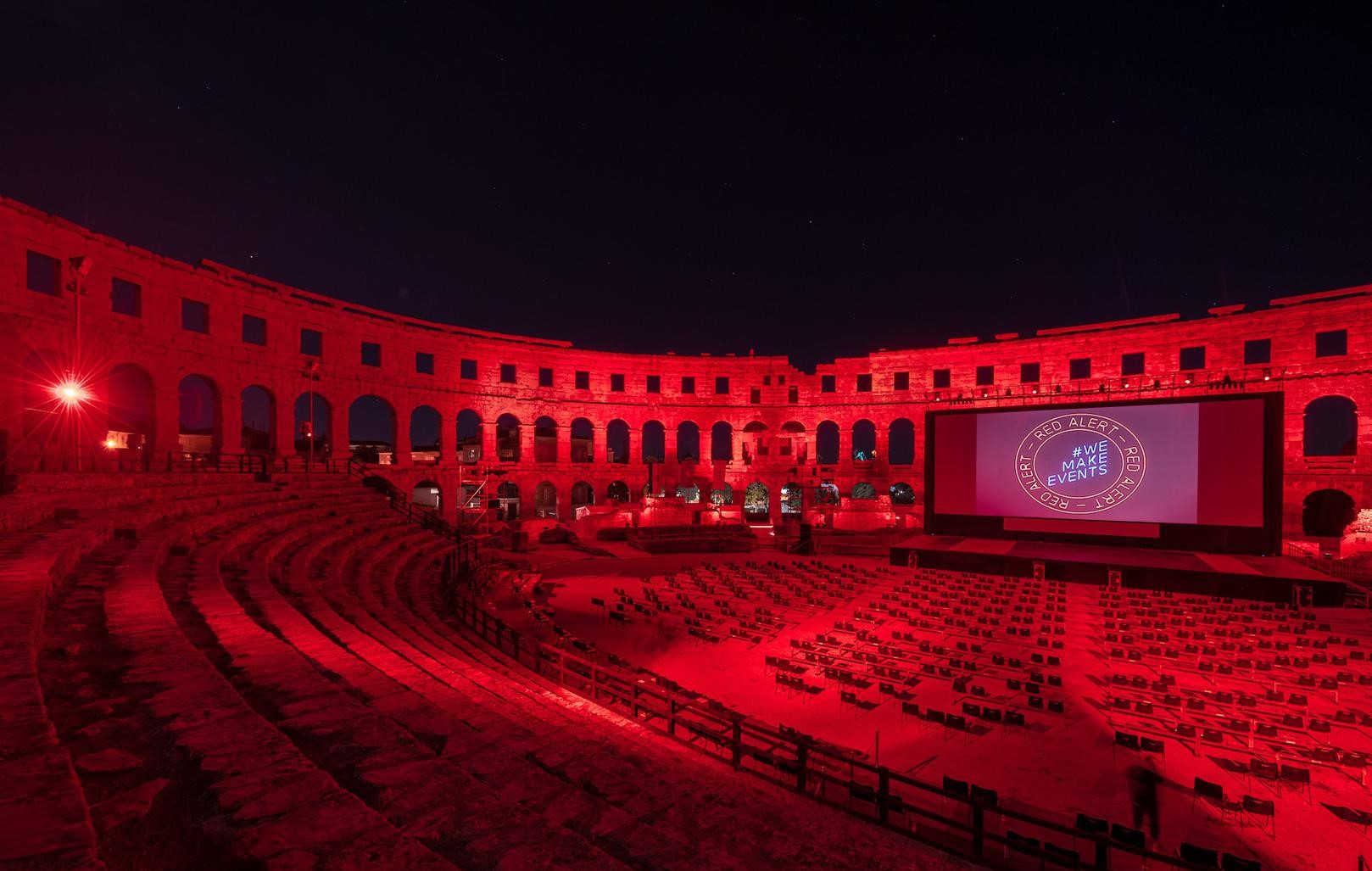
Pula amphitheatre (also known as Pula Arena) is a massively popular open-air venue in warmer months. It holds spectacular opera, ballet and classical music events as well as hosting a film festival. Like Zagreb Arena, it attracts some of the biggest names in pop and rock music. Fort Punta Christo has become famous all over Europe and further over the last decade, thanks to the internationally renowned Outlook and Dimensions festivals. Those events were supposed to take place in Tisno, at The Garden festival site. But, along with seven further festivals due to be held there this year, they chose to cancel in order to safeguard the health of their attendees and locals.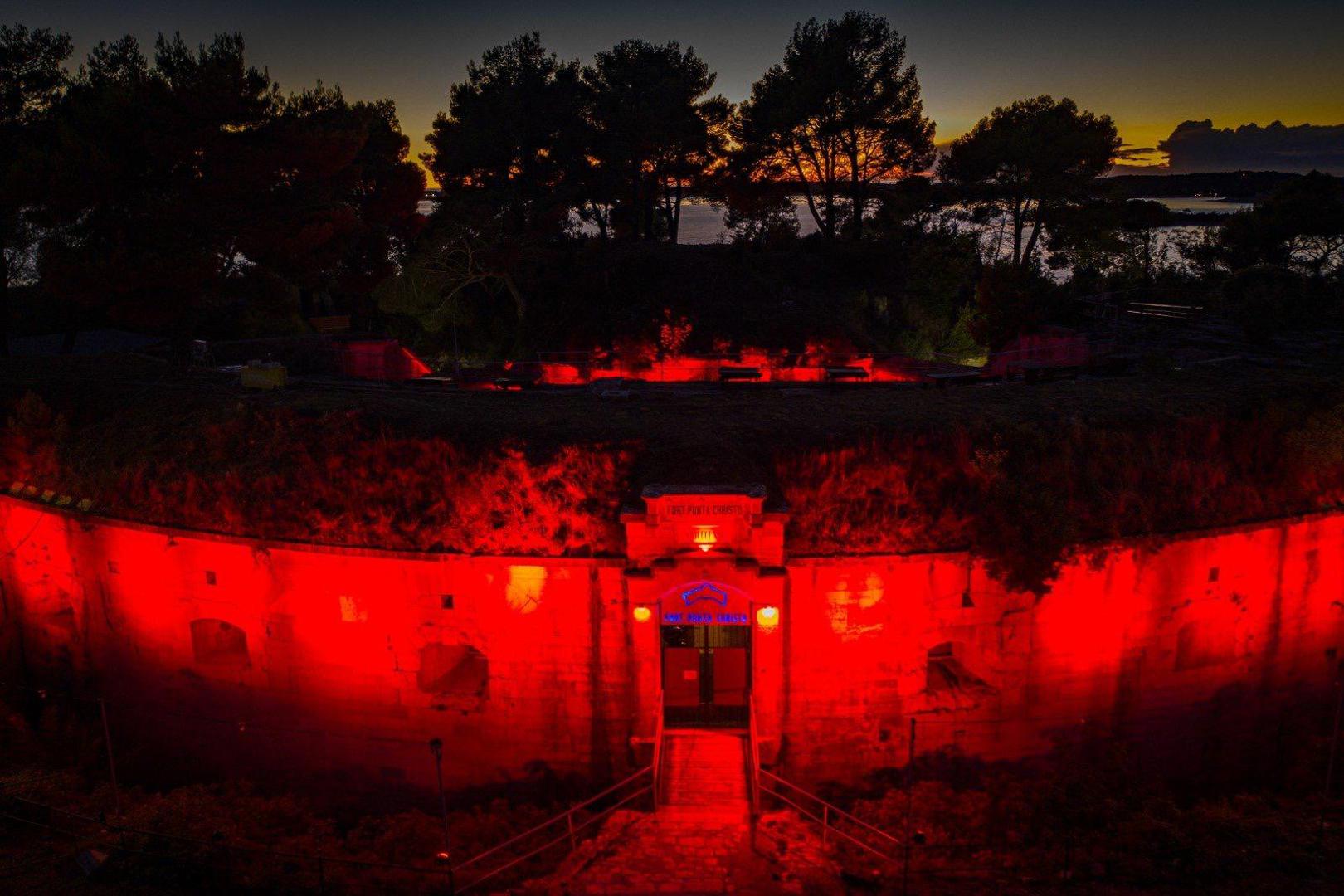
Fort Punta Christo in Pula is widely known as a host site for international music festivals
The Croatian events industry alone is comprised of 2000 business entities, has more than 12,000 employees, and annually generates HRK 4.5 billion. Autumn/winter 2021 is the soonest estimated point at which large scale events could return to normal. The Red Alert campaign has been undertaken to highlight the plight of the events industry as many sections within it face total collapse if deprived of work until then. 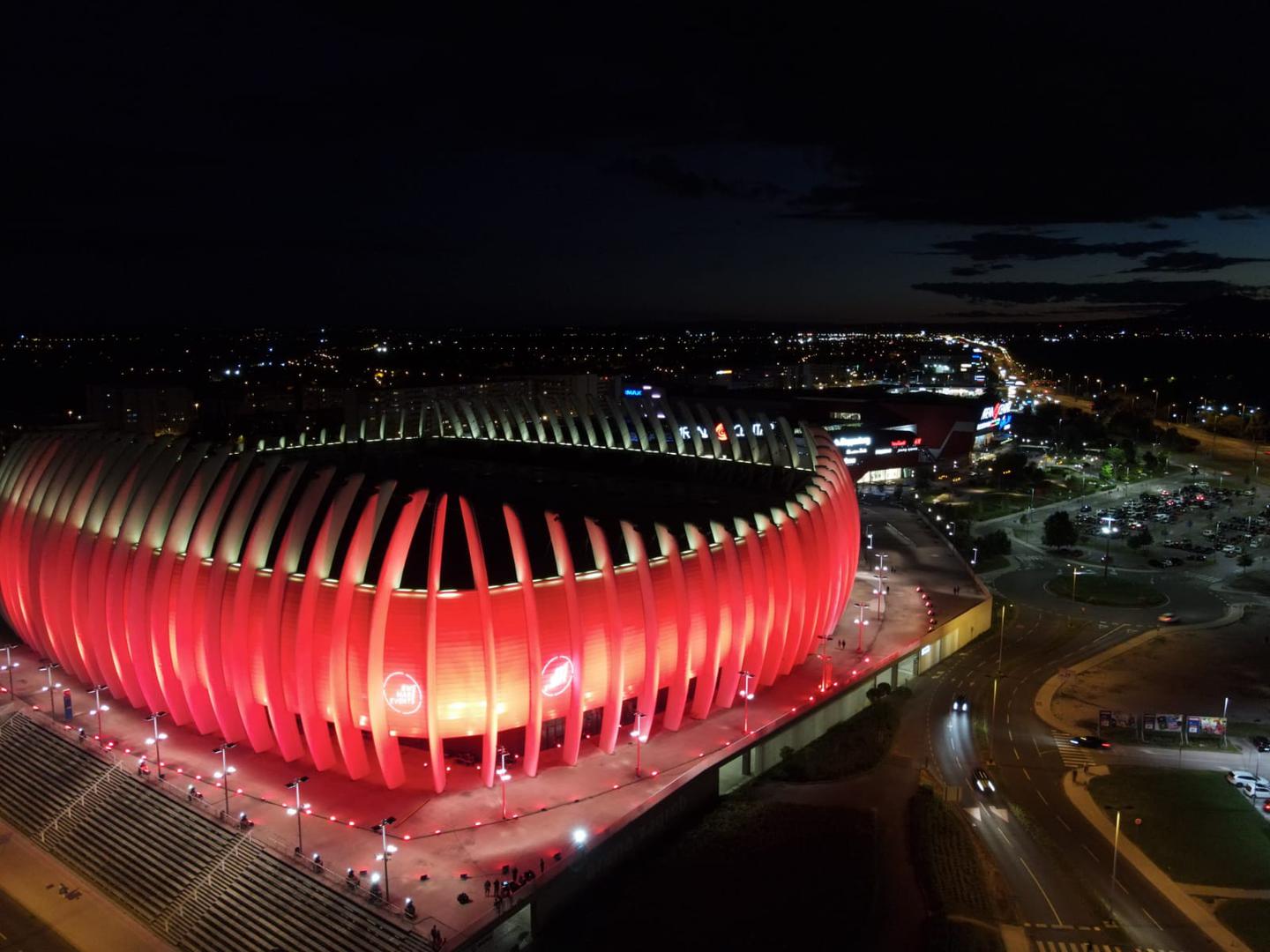
All photos © Red Alert
For the latest travel info, bookmark our main travel info article, which is updated daily.
Read the Croatian Travel Update in your language - now available in 24 languages
Recalling the 1573 Peasants Revolt Through Music: Meet Sage
January 25, 2020 - Meet Sage, a modern band finding inspiration in the Peasants Revolt of 1573.
Enio Vučeta, guitarist and back vocalist in the band Sage, national archery champion and knight, reveals to us how he connected the music world with the world of reenactment.
His first touch with music was at the age of 9 when he enrolled in Music school. His choice was a guitar, and it seems as though he didn't make the wrong choice. Enio is today a guitarist and backing vocalist for the band Sage, a group which recounts history.
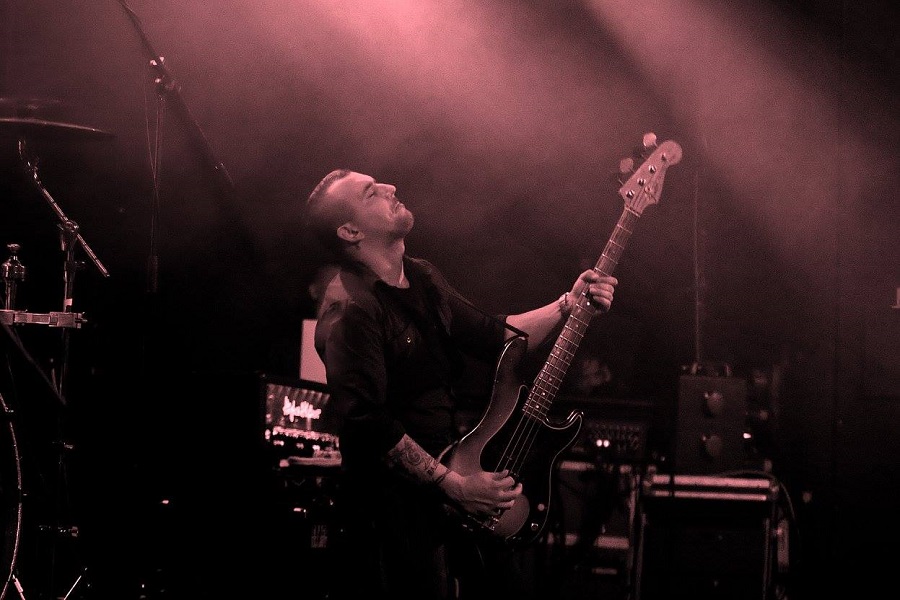
If we go back to 1982 and read the advertisements in Večernji List, we would see Enio's ad: "I'm looking for musicians for my band." At that time, Enio was in the military. When he returned in the autumn of 1983, some musicians contacted him, and so they started as a band named "Legija". They produced a few songs, held concerts all over former Yugoslavia, produced a vinyl album for PGP RBT (a record label from Belgrade). "Legija" was a thing for quite an extended period, but then band members got married, followed by children, and so they decided to split. As they had no more time for traveling, they put their families first and stayed friends.
Here the story of Legija ends, but the music inside of Enio continued to live.
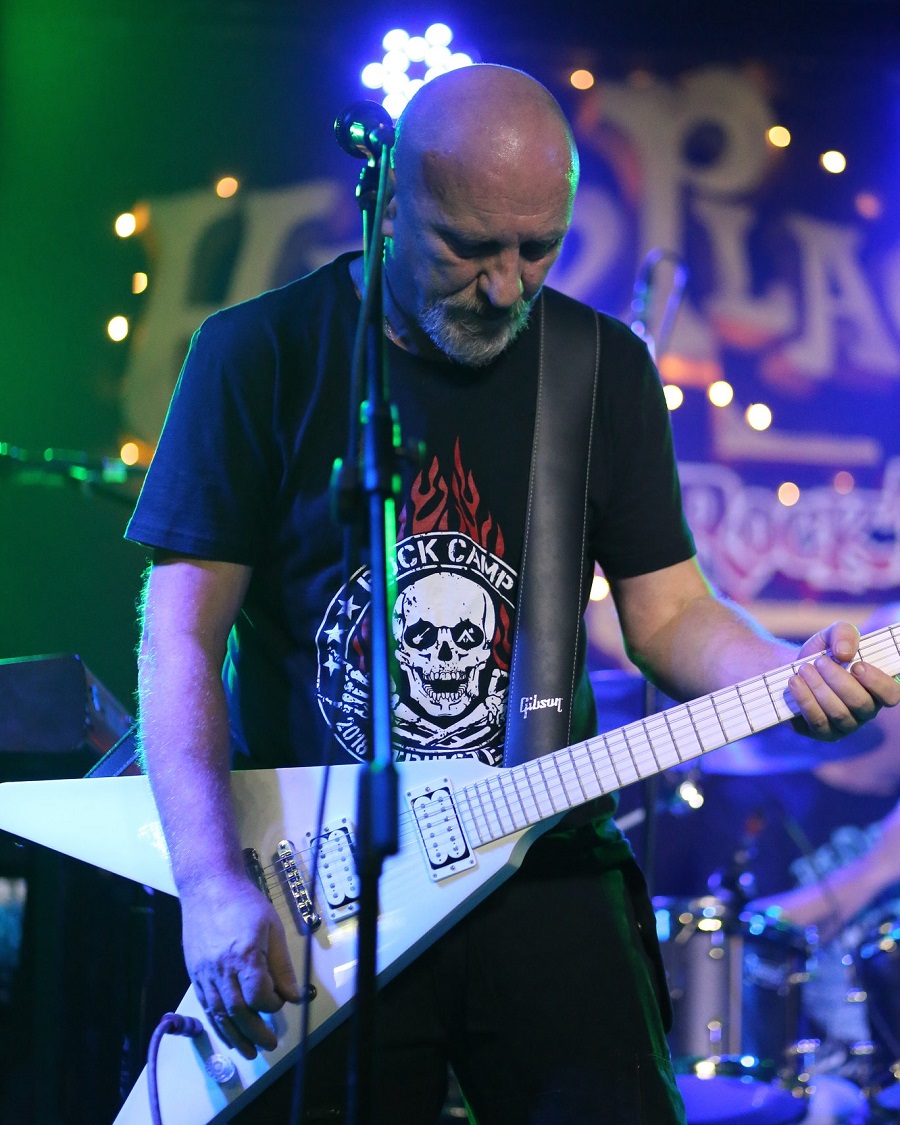
Enio founded a new band called Sage six years ago. If you ask him what music do they play, the answer will be: "Our music doesn't belong to any particular genre. We take what we like the most in songs of bands we listen to and combine them into one. So it is a kind of mix of heavy/power/progressive music."
Davor Bušljeta is the lead singer, Marko Karačić takes care of bass guitar, guitars and backing vocals are handled by Enio Vučeta and Nino Kuže, the king of drums is Goran Mikulek, and keyboards are in the hands of Andrej Božić.
(Sage in Tvornica Kulture in Zagreb)
In its short existence, Sage began a fruitful collaboration with Casey Grillo - former drummer from the American metal band Kamelot, who is producing Sage's debut album. Songs were mixed in Morrisound studios (Florida) by Jim Morris and supervised by producer Casey Grillo. LP 'Anno Domini 1573' was recorded in JM Sound studio (Croatia) by famous producers Franjo Valentic and Fedor Boic.

But it is the concept of their first album story that is unique. Now, they decided to recount a story about Seljačka buna (the Peasant's Revolt) of 1573. As you may not know, after complaining in vain to the emperor and local ban about the atrocities committed by foreign nobles, the villagers stopped paying unreasonable taxes in protest. Thus, one of the worst nobles, Francis Tahy, sent his armed mercenaries, but the villagers readily welcomed them. Because of this resistance, the Croatian Parliament declared the peasants' traitors to their homeland, to which they responded with a universal uprising against the feudal lords.
Sage used this historical event as an inspiration for their album. For each song they produced, they also made a video with a short story. So, when you listen (and watch) the whole album, song by song, you get the complete story of Seljačka buna.

Enio explained the reasoning behind the band's direction for their debut album:
"I think there are enough bands in the world that sing "I love you, and you left ..." etc., and that these are the topics that have described so many times that they became banal. We wanted to do something timeless. The issue of the Peasant Revolt was current 100 years ago; it is ongoing now, it will be present in 500 years; as long as there are rich and poor in the world, as long as the rich oppress the poor. The Peasant Revolt was not only in Croatia. It has been going on ever since the world has existed in every area where people live. Always rich, always greedy, always trying to exploit someone. The theme of good and evil is eternal. I mean, love is also eternal, but it is worn out so much that I see no reason for my band to do it, either. We wanted something that would be outside the scope of popular music, and again that was lively and current."
Most Croats do not recognize Sage, but foreigners do. They have released a CD for Rockshots Records, a Turin record company. They have signed a worldwide contract so that their CD can be purchased worldwide not only online but also physically, in a way that you come to the store and can buy it. There is less of that in the world.
As they work hard on their new album, make sure you follow them on Facebook and YouTube. Until then, discover a truth under the name of Seljačka buna.
Zagreb Philharmonic Orchestra to Perform in Rome to Mark Croatian EU Presidency
ZAGREB, January 21, 2020 - The Zagreb Philharmonic Orchestra is giving a concert in Rome this Thursday, 23 January, to mark the beginning of the Croatian six-months presidency of the Council of the European Union, the orchestra says on its website.
It will be a first in a series of cultural projects that are planned for several EU members capital cities, with purpose of introducing its citizens with Croatia as well as commemorating its presiding over the European Union.
"In accordance with its mission of preserving and nurturing Croatian musical heritage, the Zagreb Philharmonic Orchestra will present works by Croatian composers, including Bersa’s Idyll For Orchestra, the Great Polonaise in C Major by Vatroslav Lisinski, as well as Devčić's Poskocnica Dance from Istria Suite," the orchestra says in the presentation of its programme for the Rome concert.
The concert in the Italian capital city will be staged in the Auditorium concert hall, which is "a part of the historic and magnificent building of Academia Santa Cecilia in Rome, with an impressive capacity of 2800 seats."
The concert under the baton of maestro Dawid Runtz features also "violinist extraordinaire Roby Lakatos and his ensemble, together with solo performances by two of Croatia’s best young musicians, prodigal pianists Ivan Krpan and Mija Pečnik."
More music news can be found in the Lifestyle section.
Zagreb Philharmonic, Music Youth of Novi Sad Launch Cultural Project
ZAGREB, July 7, 2019 - The Zagreb Philharmonic and the Music Youth of Novi Sad cultural institution have launched a joint, EU-funded project of cross-border cooperation during which the Zagreb Philharmonic will stage 24 concerts in the eastern Croatian towns of Ilok and Vukovar and in Novi Sad and Subotica, in the northern Serbian province of Vojvodina, performing music from Charlie Chaplin's films The Kid and The Circus.
Speaking at the launch of the project in Ilok on Friday, Zagreb Philharmonic director Mirko Boch said that this was one of the most important events in the history of the Zagreb Philharmonic, organised in cooperation with the Music Youth of Novi Sad with which the Zagreb Philharmonic had already successfully cooperated.
"Even though they are old, The Kid, made in 1921, and The Circus, made in 1928, are actually timeless movies as is the music composed for them. The original score will be performed by our 50 musicians under the baton of Maestro Krešimir Batinić," said Boch, adding that he hoped the project would contribute to what the region could offer in terms of cultural tourism.
The project will start in Novi Sad, with two concerts a day to be staged on September 3, 4 and 5, followed by concerts in Ilok on September 9, 10 and 11, while concerts in Subotica and Vukovar will be staged in May and July 2020.
The head of the Music Youth of Novi Sad, Milan Radulović, said that Novi Sad, this year's European Youth Capital which in two years' time will hold the title of European Capital of Culture, was eagerly awaiting the concerts by the Zagreb Philharmonic.
Zagreb Philharmonic conductor Batinić said that the project would be a challenge as well as a great experience because the orchestra would be performing music from the two Chaplin films while they were screened, which, he said, would require great concentration on the part of the conductor.
More culture news can be found in the Lifestyle section.
Serbian Singers Rule Croatian YouTube
For about ten days, the most popular video on YouTube's trending list for Croatia was Serbian singer Anastasia Ražnatović, the daughter of Serbian singer Svetlana Ražnatović Ceca and Željko Ražnatović Arkan, the assassinated commander of the paramilitary Serbian Volunteer Guard against whom the Hague tribunal filed an indictment in 1999, reports Index.hr on April 11, 2019.
She was replaced on the top spot by Serbian singer Saša Kovačević. Since several days ago, the first position has been held by Bosnian rappers Jala Brat and Buba Corelli, with their new song "Bebi". With the exception of Severina and Jelena Rozga, it seems that Croatian musicians simply cannot reach the top position.
What do Serbian songs and videos have, and the Croatian ones do not? “When you look at these videos, you have a feeling of watching world-class performers. The fact is that Serbian singers are investing a lot more in the production of their videos, but also in the music itself. Jala Brat and Buba Corelli have been ruling the Balkan music scene for some time, and they are absolutely following the global trends,” TV host Dalibor Petko said, adding that so-called folk songs are not the only one which are popular.
“None of the first three songs on the current list are folk songs, and I think people are mistaken in believing that all songs coming from Serbia are folk songs. Željko Joksimović and Dara Bubamara do not produce the same kind of music. Serbian music has its fans in Croatia, and this did not happen yesterday. If you look at the clubs, at least 70 per cent of the clubs play Serbian music, often in combination with Croatian performers under the common brand Balkan Party,” he explained.
Although Croatian performers often issue new songs, their numbers are not anywhere near the numbers produced by the Serbian music industry. “Serbian performers record a lot more than the Croatian ones. The key is how much the audience likes a certain song or not,” said Petko.
If we return to the 1990s, the Croatian dance music fever dominated Croatia, both in the media and in the nightclubs, but it has since been replaced by folk music. Petko said that the audience is the only reason for that change. “During the dance era, it was often said that this is terrible music and should be abolished, and then the folk music came in. The fact is that we generally do not have appropriate music for clubs, which need songs with strong rhythm.”
Listeners do not care where the music is coming from. “Today's YouTube generation is not interested in politics and who comes from where. Slovenians adore Croatian music, and there are even some Slovenian singers performing songs in Croatian in order to be more popular in Slovenia,” he explained.
“I would not agree that music can be bad. What will someone listen is a matter of personal choice and tastes should not be discussed. I am absolutely against any bans, and in today's world you always have the option to change the programme or the radio you listen or the video on YouTube,” concluded Petko.
Translated from Index.hr (reported by Antonija Senjak).
More music news can be found in the Lifestyle section.
Diana Krall, Eros Ramazzotti, Enrique Iglesias to Perform in Croatia
ZAGREB, April 1, 2019 - Popular Canadian jazz pianist and singer Diana Krall will play Opatija on July 18, while another global star, Eros Ramazzotti, will take the stage in this northern Adriatic resort on August 15, organisers of the Opatija Summer Festival have announced.
Diana Krall is one of the highest selling musical artists of the modern age, having sold over 15 million albums worldwide. She has won three Grammy Awards, eight Juno Awards and released nine gold, three platinum and seven multi-platinum albums.
The singer, who is married to British singer/songwriter Elvis Costello, released her most recent album, a collaboration with Tony Bennett titled 'Love Is Here to Stay', in September 2018.
Krall held her first concert in Croatia in the late 1990s.
Ramazzotti, who is popular in Italy and most European countries, and throughout the Spanish-speaking world, as he has released most of his albums in both Italian and Spanish, has released 11 studio albums, one EP, three compilation albums, three live albums, and 37 singles. He has sold over 60 million records in his 30-year career.
Global Latino star Enrique Iglesias will play Zagreb on December 1. His second concert in Croatia will be held as part of his tour "All the Hits Live", which began on March 11, 2018 in Budapest and ends in Madrid on December 7, 2019.
In Croatia, Iglesias will perform his greatest hits, like Bailamos, Rhythm Divine, Be With You, Duele El Corazon, Subeme La Radio, El Baño, Hero and Bailando. The show in the Zagreb Arena will involve a lot of special effects, including a LED light wall of 500 m2 and pyrotechnic effects.
The last time he performed in the Croatian capital was in 2016 on his birthday. “My favourite birthday present was my performance in Croatia. It was unbelievable, it was really cool. 18,000 people came,” he said in a video posted on his Facebook page.
More news about concerts in Croatia can be found in the Lifestyle section.


